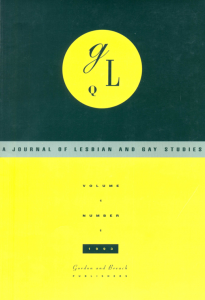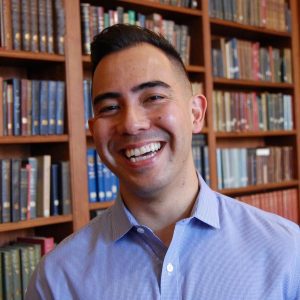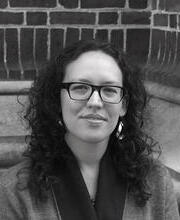Queer Melancholia
by Kris Trujillo
 GLQ: A Journal of Gay and Lesbian Studies, founded in 1993, offers an exemplary site for understanding the rise of queer theory, which, from the start, has struggled with the tension between institutionalization and radical resistance. By situating the emergence of this journal and queer theory in general within the AIDS crisis and the literary tradition of the elegy, this essay offers a reading of conventional academic practices as rituals of queer melancholia that comes to challenge the assumption of queer theory’s secularity.
GLQ: A Journal of Gay and Lesbian Studies, founded in 1993, offers an exemplary site for understanding the rise of queer theory, which, from the start, has struggled with the tension between institutionalization and radical resistance. By situating the emergence of this journal and queer theory in general within the AIDS crisis and the literary tradition of the elegy, this essay offers a reading of conventional academic practices as rituals of queer melancholia that comes to challenge the assumption of queer theory’s secularity.
The essay begins:
“Time for a new journal,” announce founding editors Carolyn Dinshaw and David M. Halperin in the first issue of GLQ: A Journal of Gay and Lesbian Studies. Time, thus, presents itself as one of queer theory’s central concerns from the start, but what kind of time is ushered in by Dinshaw and Halperin’s words? In their declaration that it is “time for a new journal,” they invoke at least two temporalities. On the one hand, “time,” here, is the historical moment of GLQ’s founding—that opportune moment in the early 1990s when the coincidence of a vibrant and necessary queer politics and increasingly innovative queer scholarship seemed to call for “a journal dedicated solely to this interdisciplinary field, a field that is at once rapidly expanding and delimiting itself.” This time is kairotic time—an opportune moment for decisive action that, in this case, opens up the possibility to reimagine queerness and, what is more, the very queerness of time. On the other hand, the time they invoke is also the regular and regulated time of scholarly production—not only the regularity of a journal that adheres to quarterly publication but also the regularity of newly appearing journals meant to keep apace of the constant development of new fields. Indeed, GLQ’s dominant association with a version of the queer that emphasizes disruption, opposition, and radicality obscures the institutionalized conventions to which it adheres as a journal in the first place.
The extent to which Dinshaw and Halperin acknowledge the significant move toward institutionalization that founding a journal marks cannot be overstated. Instead of forgoing institutionalization altogether, Dinshaw and Halperin “make no bones about the fact that with this journal [they] seek a broader, wider niche for lesbian and gay studies in the academy and in cultural life.” As they elaborate, “Such institutional and cultural acknowledgment brings money, curricular space, and jobs, and such support increases our capacity to do new work.” And even as they recognize that “as everyone is aware, with growing institutional recognition, lesbian and gay studies runs the risk of losing its edge and narrowing its desires,” they do not take this as a reason to disavow entirely the institutional forms that render queer theory legible to the academy. On the contrary, they rely upon institutional conventions just as much as they seek to remake them. As they explain, “GLQ locates itself in this tension, seeks to play it out.” Instead of opposing repetition and disruption, then, Dinshaw and Halperin suggest that the very notion of queer theory that emerges from the pages of GLQ requires the citation of older and established forms. In other words, the radicality of queer theory is inseparable from a logic of iteration, or, as I would suggest, it is precisely through repetition—by which I mean the citation of norms and practices and not the perfectly faithful reproduction of the same old institutional forms—that the very notion of queer disruption is cultivated and even made possible. By attending to the institutional norms from which GLQ draws, we may better situate the journal and queer theory within a set of intersecting conditions including the history of the theory journal, the queer politics of grief in the context of the AIDS crisis, and the elegiac mode of literary studies. The ritualization of these norms, I will suggest, shifts focus away from the queer exceptionalism of iconoclasm, disruption, and shock toward queer repetition, persistence, and survival.
Rather than see the institutionalization and professionalization of queer theory as necessarily restrictive to the field, I turn to the theory journal in order to understand what possibilities for transformation and resistance exist in such a conventional object of the profession. As Jeffrey Williams claims,
The theory journal, in its profusion and institutional mass, did not only report the developments of theory but created the expectation of theory; like a museum that has a wall of frames of a certain size and color to be filled, it precipitated a certain form of writing. Temporally, the theory journal did not merely gather things after the fact but prompted the kind of writing known as theory.
Following Williams, I ask how GLQ, as a theory journal, generates the possibility of new forms of queer theory rather than simply gathers theories that conform with its expectations. Indeed, in recounting the founding of GLQ, Halperin is clear to place it alongside other theory journals like Representations, Screen, Yale Journal of Criticism, Qui Parle, Raritan, diacritics, Textual Practice, differences, and Signs and, therefore, to emphasize the journal’s relationship to literary studies. My focus here will be less on the institutional history of the theory journal and more on the ways in which institutional forms like the academic journal sustain affective attachments and devotions to particular texts, people, and communities.
I will argue through a reading of GLQ that queer theory normalizes intellectual labor as itself a practice of mourning and that this ritualization of grief challenges the assumption of queer theory’s secularity. Following Jacques Derrida, who claims, “All work in general works at mourning,” I suggest that queer theory’s sustained scholarly attention to Freudian melancholia is inextricable from the experience of what I call “queer melancholia,” which forgoes any clear distinction between normal mourning, on the one hand, and pathological melancholia, on the other, in favor of what Jahan Ramazani calls “melancholic mourning,” or a mourning bereft of consolation. By situating the emergence of queer theory amidst the AIDS pandemic and within a longer tradition of the elegy, I hope to show how the practice of queer theorizing is inseparable from the rituals of caring for the dead. Ultimately, to frame queer time within the terms of ritual, I suggest, is both to challenge queer theory’s secularity and the progressive temporality to which it is bound and to arrive at an understanding of how the conventions of ritual repetition in theory can actually give rise to resistance and new forms of communal life. Continue reading free of charge for a limited time …
 KRIS TRUJILLO is Assistant Professor in the Department of Comparative Literature at the University of Chicago, where he teaches and researches Christian mysticism, religion and literature, theories of gender and sexuality, and queer-of-color critique. He is currently working on two book projects. The first examines how rituals of communal, embodied, and affective devotion give rise to Christian mystical poetry. The second offers an intellectual history of ecstasy from early Christianity to queer theory.
KRIS TRUJILLO is Assistant Professor in the Department of Comparative Literature at the University of Chicago, where he teaches and researches Christian mysticism, religion and literature, theories of gender and sexuality, and queer-of-color critique. He is currently working on two book projects. The first examines how rituals of communal, embodied, and affective devotion give rise to Christian mystical poetry. The second offers an intellectual history of ecstasy from early Christianity to queer theory.


 This article offers a reading of Theresa Hak Kyung Cha’s 1982 experimental text DICTEE as performing purposefully ambiguous devotional work. As a meditation on unfinished struggles against colonial and patriarchal violence, DICTEE registers devotion’s role in both oppression and liberation. Cha’s engagements with female martyrs, Korean mudang shamanic practice, and colonial languages demonstrate the inseparability of structures of domination and traditions of resistance. The essay argues that even as DICTEE wrestles with inescapable forms of complicity, its efforts to transform perception denaturalize the violence of racial, gendered, and political divisions.
This article offers a reading of Theresa Hak Kyung Cha’s 1982 experimental text DICTEE as performing purposefully ambiguous devotional work. As a meditation on unfinished struggles against colonial and patriarchal violence, DICTEE registers devotion’s role in both oppression and liberation. Cha’s engagements with female martyrs, Korean mudang shamanic practice, and colonial languages demonstrate the inseparability of structures of domination and traditions of resistance. The essay argues that even as DICTEE wrestles with inescapable forms of complicity, its efforts to transform perception denaturalize the violence of racial, gendered, and political divisions. ELEANOR CRAIG
ELEANOR CRAIG